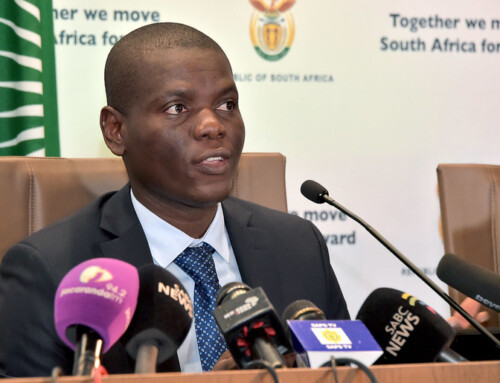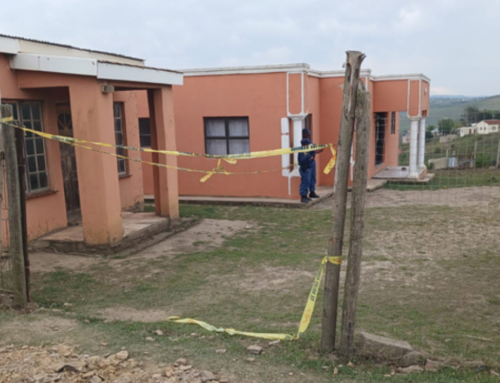 By Yongama Zigebe, UDM Secretary General
By Yongama Zigebe, UDM Secretary General
Now that the National Student Financial Aid Scheme (NSFAS) is under administration, the United Democratic Movement (UDM) believes that there is a dire need to find a new approach to resolve the myriad challenges in the scheme immediately. It is important that the required actions be done to guarantee that the programme is run in a way that benefits the students who depend on it.
This is definitely a state where NSFAS needs to be transformed completely, but to truly transform the landscape of NSFAS funding challenges, it is essential to identify and address the root causes. At this point the Department of Higher Education and Training (DHET) must go beyond surface-level solutions, delving into systemic issues that contribute to funding challenges. To understand and rectify these foundational problems, a more robust, advanced and sustainable financial support system for students, is required.
Furthermore, addressing these challenges requires collective efforts to implement strategic solutions such as policy reforms and improved communication. It is vital that during the transformation of NSFAS, government and advocacy groups do continuous monitoring and evaluation of the effectiveness of changes made in the scheme for sustained improvement, in order to create a more accessible and reliable financial support system for students across all institutions of higher learning.
To address the issues at NSFAS, the UDM proposes implementing an administrative restructuring in consultation with all relevant stakeholders, including students, universities, and service providers. The primary goal of this overhaul would be to streamline the payment process for students and service providers.
Given the upcoming National and Provincial Elections in South Africa, calling for the resignation of Higher Education, Science and Technology Minister, Dr Blade Nzimande, as previously done, may not be practical at this juncture. However, we hope that the incoming Minister of Higher Education, Science, and Technology will effectively fulfil their political oversight role without overstepping their bounds.
The UDM believes that the pursuit of higher education is a dream for many, and the NSFAS established several years ago, was designed to uplift students by offering financial assistance for tuition, accommodation, and other essential needs, in order to make this dream a reality for countless students. NSFAS, has been a lifeline for numerous students, particularly those from economically disadvantaged backgrounds. However, in the recent years the scheme has become a nightmare of financial mismanagement, incompetence, leaving thousands of students grappling with funding issues and service providers have complained about tardy pay-outs.
The crisis surrounding NSFAS is yet another reminder of how completely the South African government has failed to fulfil its most basic duty of providing fair access to education for everyone. This unacceptable state of dysfunction in NSFAS is a reflection of an overall picture of governmental neglect and disinterest to the condition of South Africa’s youth.
The UDM has for years been advocating for NSFAS’s reform and has also been calling for Dr Blade Nzimande to be taken to task over his political interference in the DHET, NSFAS as well as the Sector Education and Training Authorities (SETAs).
Despite numerous letters sent by the UDM to President Cyril Ramaphosa regarding Minister Nzimande’s alleged misconduct, there has been no response. The President has remained silent on allegations of nepotism, political interference, and wasteful expenditure within the DHET, NSFAS, and the SETAs. One glaring example is the NSFAS’s decision to move to a new building using a turnkey solution. This move increased monthly rent from R500,000 to a whopping R2 million, while students face delays in payments and others are denied access to much-needed funds. In addition, NSFAS reportedly spent millions of rands on new furniture for their office space instead of using furniture from their previous offices. The UDM has requested the Hawks and the Special Investigating Unit to investigate this matter.
Under the previous Board, that was recently dissolved by Minister Nzimande (a decision which the UDM agrees with), NSFAS has been unable to effectively and efficiently discharge its mandate of disbursing funds to students and has also failed to account to Parliament with annual reports for two financial years, 2021/22 and 2022/23, respectively. Furthermore, the information technology systems-related inadequacies have not been addressed, causing delays in the disbursement of funds to universities and allowances to students. The long waits in cash payments defeat the purpose of the funding program by worsening financial hardships and limiting students’ academic advancement.
Minister Blade Nzimande has been dragging his feet to address the critical challenge of “missing middle” students. In January this year, Nzimande revealed that government has set aside a R3.8 billion initial capitalisation fund to support the missing middle student. The UDM welcomes the fact that 70% of the loan will support science, technology, engineering and mathematics. To date, the NSFAS ITC systems have not been capacitated to meet the demands of administering funding to missing middle students, and thousands of students continue to be financially excluded from institutions of higher learning due to debts.
Another crisis is students being excluded and unable to register in institutions of higher learning due to historical debts. In 2021 the total historical debts had skyrocketed to R16.5 billion. University sustainability is at the very heart of this problem, and they withhold the results and qualifications of those who have outstanding debts.
The government is aware of this problem, yet they have not found any funding methods to assist such suffering students. Withholding qualifications amid the high unemployment rate and stagnant economy in South Africa worsens the problem, it crushes so many dreams and aspirations as students are unable to further their education nor look for a job. Student debts continue to be a barrier for many students to participate in the economy or rather accessing economic mobility.
Following the chaos surrounding the NSFAS board’s collapse, the financial aid program is pleading with institutions to keep student allowances flowing until July. This request shows the scheme’s current state of chaos and highlights how crucial it is to have an operational leadership structure in place to oversee the allocation of funds.
The main concern with the ongoing chaos in NSFAS is that it brings instability to the universities and technical and vocational education and training (TVET) colleges due to unpaid allowances, challenges with the accommodation. Student protests at many affected institutions have always disrupted the academic programmes and eventually, this affects the overall students’ performance.
NSFAS needs effective solutions such as bringing in the most qualified board members and fire the four outsourced companies that are responsible for distribution of funds. It is concerning that NSFAS has been placed under administration, changing board members is not an effective method of addressing the challenges at NSFAS, what is more important is to investigate the current NSFAS workforce and the institutional culture.
If there is no change in NSFAS’s institutional culture, there will certainly still be regression after the administration has come to an end.
Mr Yongama Zigebe
Secretary General of the United Democratic Movement





























